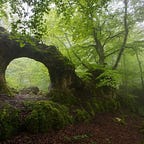Rewilding our landscapes and our lives
Last week I took the opportunity of a few days solo camping in the Peak District to be in nature, as well as meet long-lost family members I hadn’t been able to see since the start of lock-down. I hadn’t anticipated that I might also experience a profound encounter with a bird which had flown over from the Alps no less, which is making the Hope and Derwent Valleys its home.
The lammergeier (bearded vulture) is a species which had become almost shot to extinction in the Alps, due to its reputation of stealing lambs and even snatching human babies, a false reputation as, being an old world vulture, it survives on bones and carcasses, preventing the spread of disease, rather than killing live prey. A programme in the last few years has seen several hundred of these magnificent birds re-introduced, and the one currently living in the Peak District in England, still with the dark head of a juvenile bird, is believed to have flown over from there — whilst vultures are capable of flying at remarkable heights and over a wide terrain, it is nevertheless an impressive journey.
After a long walk around the moors, I finally spotted the famed lammergeier. It was riding the thermals, hovering above the heads of mountain bikers climbing the slopes nearby, yet far away from the army of birdwatchers which had flocked to see it. I decided on an impulse to scramble up a steep sided hill to observe it circling round, and was astonished that it landed about 100 metres away from me to feed. A heart-stopping moment, captured rather grainily on my phone:
Although non-native to the UK, this lammergeier gives us a glimpse of what a re-wilded and regenerated countryside might look like, brimming with bio-diversity, full of wonder. Yet I recognise that in the context of the many intersecting crises happening in the world today, this might seem like a very privileged concern. We are facing accelerating climate change and a threat to our very survival as a human species, a global pandemic and heightened social unrest and protests from the US to Hong Kong, so it might seem that nurturing wild spaces is but a side issue. But if we look a little deeper into some of the shared roots of these complex challenges, we can see they are intimately entwined in legacies of exploitation, extractive economies and an unwillingness to embrace diversity of people and ideas — a divide and conquer philosophy which plays into the hands of the world’s elites.
The Peak District is a microcosm of this pattern, with large swathes of moorland regularly burnt, and birds of prey shot by gamekeepers to enable the privileged few to engage in grouse hunting. This comes at the expense of natural re-colonisation of species filling and creating diverse habitats and niches. It mirrors what can happen to our souls also, when we succumb to a world view which sees wanton destruction as inevitable, where we give the best efforts of our lives to organisations and professions which demand conformity in service of owners and shareholders.
Patterns of destruction, and trauma, are fractal — occurring at many levels of system — from the soul level, to biome to macro-global levels. And we need to understand that healing occurs in fractal patterns also, and that Nature has within it the capacity for self-healing, when given the right conditions. As the farmers at the Knepp Estate discovered, allowing the land to return to its natural condition drew in, not only a rich array of previously unseen species, it also had no discernable negative impact on their farming income itself, as their cattle naturally re-wilded along with the land.
Nature is calling us, drawing us in, to those who would listen — there is an inner and an outer re-wilding, an inner and an outer restoration and healing which is wanting to take place. As many of us take time over the summer in the Northern Hemisphere to regenerate ourselves in preparation for ongoing campaigning, activism, world-work, addressing trauma, healing…. take some space to invite in a re-wilding of the soul.
__________________________________________________________________
Katherine Long works in the fields of leadership and organisation development, and individual and collective trauma and healing. Katherine will be leading an in-person retreat in Nature on 27th August 2020 at Hawkwood, ‘The Dance of Trauma and Healing’.
Published By
Originally published at https://www.linkedin.com.
